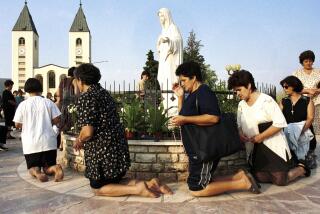Superstition Rampant in China Despite Ban by Communists : Folkore: Taboos imposed by the government on centuries-old practices are being ignored with easing of economic controls.
CHENGDU, China — A cemetery official stopped a man with a three-foot-tall paper house from performing the centuries-old ritual of burning paper offerings at a relative’s grave.
“That’s superstition!” the official snapped.
The man pointed to countless other people burning incense and fake paper money at graves and protested, “But all of this is superstition.”
China’s Communist rulers virtually eradicated superstitious practices after gaining power in 1949, but they returned in the past decade as economic reform loosened controls on everyday life and gave people more money to spend.
Repeated official campaigns against “feudal superstition” have failed, indicating the strong hold traditional beliefs have on the Chinese. More importantly, it shows that the Communist Party has lost its once-total control over everyone’s life.
Soothsayers and fortune tellers advertise at railroad stations and other public places. Peasants in the prosperous south build small ancestral shrines and tombs. Villagers hold elaborate weddings for dead children so they can be married in eternity. Wealthy businessmen pay more than $9,000 for cellular telephones with lucky numbers.
Although authorities prohibit the most blatant superstition practices, such as burning the huge paper house, they usually turn a blind eye to less provocative acts.
Authorities on Funeral Market Street in Chengdu readily acknowledge that it is illegal to sell phony paper money, incense and other items used as ancestral offerings.
“They’re banned, but it’s impossible to stop people from selling them,” said Guan Hui, who has worked in the market’s supervisory office for 10 years.
The market outside Wenshu Monastery, an ancient Buddhist temple in the capital of Sichuan province, southwest China, specialized in funeral and grave-site goods before 1949. Communist authorities shut it down, but allowed it to reopen in 1982.
Now, 179 stalls line the narrow road to the temple, each selling a variety of paper offerings that, once burned, ensure a comfortable afterlife for one’s ancestors.
They include stacks of “Hell Bank Notes” in denominations of $500,000 to $10 million, paper shirts and shoes, small paper replicas of gold and silver ingots, and miniature two-story paper houses furnished with sofas, beds and stereo cassette players, also in paper.
Huang, a schoolteacher who would give only his surname, said the street is crowded “kneecap to kneecap” before Chinese New Year and Qingming, or Grave-Sweeping Day, in early spring. A friend of Huang owns one of the stalls.
Guan, the official, said, “There are too many people who are superstitious. With the temple here, it is impossible to eradicate these superstitious beliefs.”
“The higher-ups know the situation,” he added, nodding toward the grimy window of the one-room supervisors’ shack in the middle of the market. “Everybody knows.”
He argued that it is better to allow the sales than to enforce the law: “Otherwise, they would go and sell from carts on the street.”
“That way, the state wouldn’t get any money at all,” said Yin Ze, another official. He and Guan said stall owners pay monthly rent of up to $11 in addition to license fees and taxes.
Customers seemed unconcerned about buying contraband.
“I’ve been doing this every year since my parents died four, five years ago,” said a doctor who gave only her family name, Xu.
“Everybody believes in it, so I believe it too,” she said, paying for a huge coil of firecrackers and a bag stuffed with paper money and ingots.
That attitude was evident among the thousands who flocked to cemeteries the Sunday before Grave-Sweeping Day, choking the main road out of Chengdu.
By midday, the Dragon and Phoenix Public Cemetery was shrouded in smoke from exploding firecrackers and the burning of incense, candles and paper offerings.
Nearly every patch of grass on the hillside was taken up by families crowded around graves or around small boxes containing the ashes of deceased relatives.
Most Chinese are cremated. Increasingly, families buy plots to bury the ashes, but most still choose the cheaper option of storing the ashes in a funeral hall.
Dishes of fruit and sweets, even bottles of soft drinks, were laid out as offerings to the dead while relatives fed small fires with fake paper money.
Chen Liji watched approvingly as her husband and brother sprinkled two small cups of hard liquor around her parents’ grave.
“My father loved to drink,” she said. “He drank this every day. This is our way of showing respect for him, our way of remembering him. You can’t really call this superstition--it’s tradition.”
More to Read
Sign up for Essential California
The most important California stories and recommendations in your inbox every morning.
You may occasionally receive promotional content from the Los Angeles Times.










